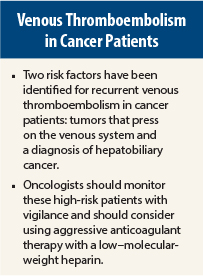Patients with cancer who develop venous thromboembolism are at high risk of such obstructive disease recurring despite adequate anticoagulation. A prespecified analysis of the CATCH trial identified two major predictors of recurrence: venous compression by the tumor and a diagnosis of hepatobiliary cancer.1
“The analysis of this large randomized controlled trial that included more than 900 patients found that patients with a tumor mass compressing the venous system—typically gynecologic cancer patients—and patients with hepatobiliary malignancies were at highest risk of recurrent [venous thromboembolism]. These findings indicate that these patients should be monitored carefully for recurrent [venous thromboembolism] and we should consider more intensive anticoagulation once they develop a first [venous thromboembolism],” said lead author Alok A. Khorana, MD, FACP, Professor of Medicine, Cleveland Clinic Lerner College of Medicine, Cleveland.
Study Details
The CATCH study was a prospective, open-label, multicenter clinical trial that included more than 900 patients being treated for active cancer who developed acute, symptomatic proximal deep venous thromboembolism and/or pulmonary embolism.2 They were randomly assigned 1:1 to 6 months of anticoagulation with tinzaparin (Innohep) at 175 IU/kg once a day vs initial tinzaparin (low–molecular-weight heparin) transitioning to dose-adjusted warfarin (target of international normalized ratio [INR] 2–3).
CATCH found that the incidence of venous thromboembolism was 6.9% with tinzaparin vs 10% with warfarin, for a significant 35% reduction in the risk of recurrent venous thromboembolism favoring tinzaparin (P = .07). Symptomatic nonfatal venous thromboembolism occurred in 2.7% of the tinzaparin arm vs 5.3% of the warfarin arm (P = .04).
There was no difference between the two treatment arms for major bleeding, but clinically relevant nonmajor bleeding was significantly reduced in the tinzaparin arm, occurring in 50 (11%) vs 73 (16%) patients (P = .03). No difference in mortality was observed between the two treatments.
Additional Data
The post hoc analysis, presented at a poster session during the 2015 ASCO Annual Meeting, was designed to identify risk factors for recurrent [venous thromboembolism] in the CATCH trial. The investigators evaluated multiple clinical variables that were present at or prior to randomization. Metastatic disease was present in 492 patients (54%), 288 (32%) were on chemotherapy, 281 (31.8%) were recently hospitalized, 209 (23.2%), had [Eastern Cooperative Oncology Group (ECOG)] performance status of 2, 129 (14.3%) had venous compression from the tumor, and 92 (10.2%) had undergone recent radiation therapy.
Multivariate analysis identified both venous compression (P < .001) and a diagnosis of hepatobiliary cancer (P = .018) as significant risk factors associated with recurrent venous thromboembolism.
Interestingly, the Ottawa score,3 recently validated to predict recurrent venous thromboembolism, did not predict which patients were at risk in this trial. The Ottawa score is composed of four variables: sex, primary tumor site, tumor state, and history of venous thromboembolism.
Raising Awareness
“[Venous thromboembolism] is a clinically important and common issue in cancer patients that may be overlooked. It is the second leading cause of death in cancer patients, equal with infection. This study should raise our awareness. The prespecified subgroup analysis of the CATCH trial adds to our knowledge about which patients are at higher risk,” said Marc Carrier, MD, MSc, FRCPC, Associate Professor at the University of Ottawa, Canada, who was not involved in this analysis.
“The risk of recurrent [venous thromboembolism] despite anticoagulation and of major bleeding while on anticoagulant therapy is increased in cancer patients. If we can identify who is at highest risk of a recurrent event, then clinicians can tailor their management accordingly,” Dr. Carrier continued.
Low–molecular-weight heparin is recommended as first-line treatment of venous thromboembolism, he continued. “Due to its higher cost, low–molecular-weight heparin is not often used in the United States. When possible, physicians should try to push for [low–molecular-weight heparin] in cancer patients, especially in the high-risk groups identified in the Khorana study,” Dr. Carrier said. ■
Disclosure: Dr. Khorana has received honoraria from and has served as a consultant/advisor for AngioDynamics, Daiichi Sankyo, Genentech, Johnson & Johnson, Leo Pharma, Halozyme, Pfizer, and Sanofi. He has received research funding from Leo Pharma. Dr. Carrier has received research support from Leo Pharma and honoraria from Sanofi-Aventis, Pfizer, Boehringer Ingelheim, Leo Pharma, and Bayer and has served on scientific advisory boards for Sanofi-Aventis and Leo Pharma. For full disclosures of the CATCH study authors, view the study abstract at abstracts.asco.org.
References
1. Khorana AA, Bauersachs R, Kamphuisen PW, et al: Clinical predictors of recurrent venous thromboembolism in cancer patients from a randomized trial of long-term warfarin versus warfarin for treatment: The CATCH study. 2015 ASCO Annual Meeting. Abstract 9621. Presented May 30, 2015.
2. Lee AYY, Kamphuisen P, Meyer G, et al: A randomized trial of long-term tinzaparin, a low molecular weight heparin (LMWH), versus warfarin for treatment of acute venous thromboembolism (VTE) in cancer patients: The CATCH Study. 2014 ASH Annual Meeting. Abstract LBA-2. Presented December 9, 2014.
3. Ahn S, Lim KS, Lee Y-S, et al: Validation of the clinical prediction rule for recurrent venous thromboembolism in cancer patients: The Ottawa score. Support Care Cancer 21:2309-2313, 2013.




